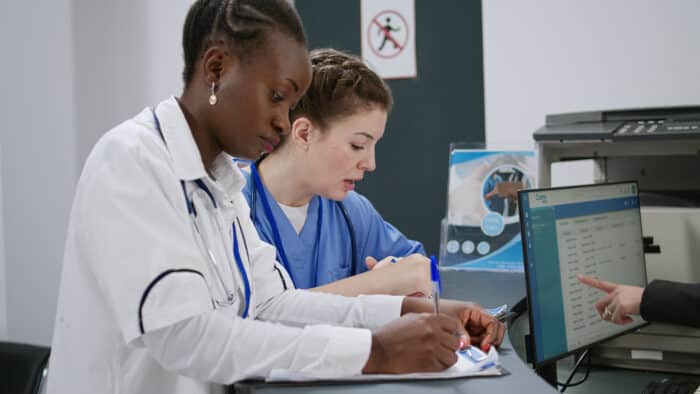Are you thinking about working in healthcare administration but don’t know where to begin?
Do you enjoy helping healthcare run smoothly?
If you answered yes, you might want to consider a career in medical billing and coding.
But what do medical billing and coding professionals do?
Well, they’re essential in healthcare, turning medical procedures into universal codes for billing and insurance.
One great thing about this career is that it usually requires specialized training rather than a formal degree, though certification is often preferred.
In this article, we’ll explain what medical billing and coding professionals do, talk about what you can expect to earn, and show you how to start your journey in this field.
So, let’s dive right in!
What is Medical Billing and Coding? And What Do Medical Billers and Coders Do?
Let’s first start with talking about the real deal.
What exactly is Medical Billing and Coding?
And what do Medical Billers and Coders do?
Medical billing and coding is all about turning medical information into universal codes for billing and insurance.
People who work in this field, called medical billers and coders, are like translators between healthcare providers, insurance companies, and patients.
Here’s what they do:
1. Coding: They assign codes to medical procedures, diagnoses, and treatments using standard code sets like CPT, ICD, and HCPCS.
2. Billing: They use these codes to create and send bills to insurance companies, government healthcare programs, and patients to get paid for the medical services provided.
3. Keeping Records: They keep detailed and accurate records of patient information, treatments, and billing. These records help track patient care and ensure everything is done correctly and legally.
4. Communication: They talk to healthcare providers, insurance companies, and patients to sort out any issues with billing or coding and make sure everyone understands what’s going on.
What is a Certified Medical Biller and Coder?
If you’ve been researching the field of Medical Billing and Coding, you might have landed on the term ‘Certified Medical Biller and Coder’.
What exactly does this mean, and how does it differ from a regular Medical Biller and Coder?
Well, let us help break it down for you.
Certified medical billers and coders are professionals responsible for translating medical procedures and diagnoses into universal codes for billing and insurance purposes. They ensure accuracy in documentation and reimbursement processes.
To obtain certification, individuals typically complete accredited training programs, gain practical experience, and pass a certification exam that shows their proficiency in coding and billing practices.
But is certification essential?
This question often arises among aspiring medical billers and coders, and today, we will try to provide clarity on this matter.
While certification may not always be mandatory in all states, achieving certification as a medical biller and coder offers numerous advantages. Mostly because employers nowadays prefer certified medical billers and coders over uncertified ones.
Certification serves as validation of comprehensive training and expertise in the field, instilling confidence in employers, colleagues, and clients.
In the healthcare industry, adherence to coding standards and regulations is of utmost importance, and certified professionals ensure compliance, reducing legal risks.
Also, certification opens doors to enhanced job opportunities and potential for career advancement, making it a valuable investment in one’s professional development.
Medical Biller and Coder Salary
Now let’s talk about how much Medical Billers and Coders earn.
According to the U.S. Bureau of Labor Statistics (BLS), the average annual salary of Medical Billers and Coders is $48,780, or $23.45 per hour.
However, it’s essential to note that these salary numbers can vary based on several factors like experience, the type of workplace, job location, and more.
Read: Medical Billing and Coding Salary
Medical Billing and Coding Career Outlook
According to the U.S. Bureau of Labor Statistics (BLS), the career outlook for medical billers and coders is highly promising. The demand for these professionals is expected to grow significantly faster than the average for other occupations.
The BLS forecasts an employment growth rate of approximately 8% from 2020 to 2030 for medical equipment preparers, a category that includes sterile processing technicians. This translates to roughly 16,500 new job opportunities for individuals entering this field.
The increased demand for medical billers and coders can be linked to several factors, including the aging population and advancements in medical technology.
As healthcare services become more sought-after, there’s a growing need for accurate documentation and billing processes to handle the complexity of medical procedures and ensure proper reimbursement. This surge in demand tells the importance of skilled medical billers and coders in managing the rewarding field of healthcare administration.
Where Do Medical Billers and Coders Work?
So now that you know mostly everything about medical billers and coders, the next question that might be popping in your mind is: but where do medical billers and coders work?
Let us answer that for you.
Medical billers and coders work in various healthcare settings, including:
1. Hospitals: Both large and small hospitals employ medical billers and coders to handle the billing and coding processes for the wide range of medical services provided.
2. Physician Offices: Medical billers and coders are commonly employed in medical practices, clinics, and group practices to manage billing and coding tasks for outpatient services.
3. Outpatient Facilities: Ambulatory surgery centers, imaging centers, urgent care centers, and other outpatient facilities often employ medical billers and coders to handle billing and coding for their services.
4. Long-Term Care Facilities: Nursing homes, assisted living facilities, and rehabilitation centers may also employ medical billers and coders to handle billing and coding for the services provided to residents.
5. Insurance Companies: Some medical billers and coders work for insurance companies, reviewing claims for accuracy and ensuring proper reimbursement for medical services.
6. Consulting Firms: Medical billers and coders may work for consulting firms that specialize in healthcare revenue cycle management, providing services to multiple healthcare organizations.
How to Become a Medical Biller and Coder?
To become a successful Medical Biller and Coder, you generally need to follow a few easy steps.
Let us walk you through them.
High School Diploma or a GED:
First things first, obtain a high school diploma or equivalent, such as a GED.
While a formal degree is not always required, completing a post-secondary education program in medical billing and coding can provide valuable knowledge and skills.
Enroll in a Medical Billing and Coding Training Program:
Enroll in a reputable medical billing and coding training program. These programs can be found at community colleges, vocational schools, and online institutions.
The training typically should cover topics such as medical terminology, anatomy, coding systems (CPT, ICD, HCPCS), insurance billing procedures, and healthcare regulations.
Certification:
While certification is not always mandatory, obtaining certification can enhance job prospects and demonstrate proficiency in the field.
The two main certifying organizations for medical billers and coders are the American Academy of Professional Coders (AAPC) and the American Health Information Management Association (AHIMA).
To become certified, you’ll need to pass a certification exam after completing your training.
Gain Experience:
Gain practical experience through internships, externships, or entry-level positions in medical billing and coding. This hands-on experience will help you apply your knowledge in real-world settings and build your skills.
Job Search:
Congrats, you’re now a certified medical biller and coder! Now you can start looking for job opportunities in medical billing and coding.
You can search for openings at hospitals, medical clinics, insurance companies, and other healthcare organizations. Networking with professionals in the field and joining relevant professional associations can also help you find job opportunities.
Conclusion
In short, medical billing and coding professionals are essential for healthcare, making sure that medical services are properly documented and reimbursed. We hope this article has given you a clear picture of what this career involves and how to get started in it.
Related Resources:
Related Articles
-
How to Be Successful in College in 2022 – 7 Simple Tips to Succeed
-
How Do Scholarships Work? Read This First…Truth is Shocking
-
7 Best College Majors 2024: What Should I Major In?
-
How to Choose a College – 10 Things You Must Consider in 2024
-
Why Go to College? Top 13 Benefits for Adult Students in 2022
-
Top 5 Best Alternatives to Community College for 2024









